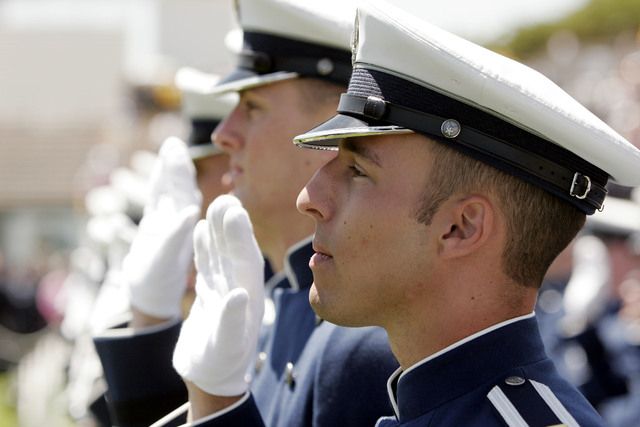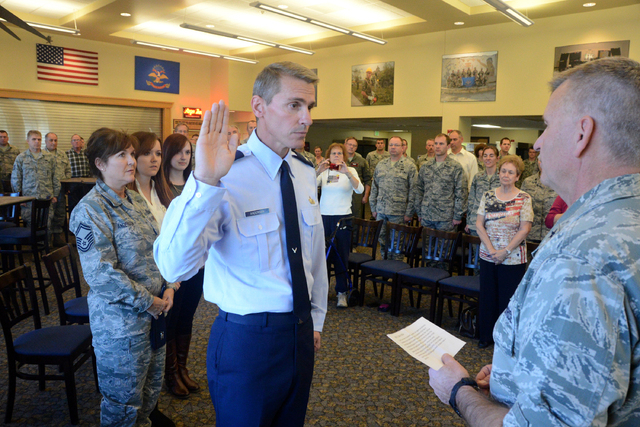Creech AFB airman challenges re-enlistment oath
A Creech Air Force Base tech sergeant who refuses to say “so help me God” in his re-enlistment oath is sending ripples through the Pentagon’s legal circles.
His attorney says she will file a lawsuit claiming his constitutional rights under the First Amendment of the U.S. Constitution will be violated if the Air Force prohibits his re-enlistment in November for omitting the phrase.
And Air Force officials think his case might affect other branches of the military.
“The Air Force recognizes that this issue impacts all of the Department of Defense,” an Air Force spokesman, Lt. Col. Christopher Karns, wrote in an email Tuesday, responding to a query from the Las Vegas Review-Journal.
“Therefore, the Air Force Judge Advocate General and the Air Force General Counsel, have requested a written legal opinion from the Department of Defense General Counsel addressing the legal parameters of the oath and the latitude an individual has in deleting the words ‘So help me God’ from the respective oaths,” Karns said.
Monica Miller, the tech sergeant’s attorney for the nonprofit American Humanist Association, said she’s pleased the Air Force is taking the matter seriously and is “confident that the weight of the law favors our client.”
She said the tech sergeant has requested anonymity because he fears retaliation. Creech, 45 miles northwest of Las Vegas at Indian Springs, is a hub for remotely piloted aircraft, or drones.
Miller said an after-the-fact opinion by the Air Force judge advocate general that disallows omitting “so help me God” in a similar case last year involving an officer trainee at Maxwell Air Force Base, Ala., “apparently ignores well-settled First Amendment case law and improperly places statutory law over constitutional rights. The Constitution trumps the federal statutes insofar as the statutes require atheists to affirm the existence of a supreme being as a condition of enlistment” or re-enlistment.
Miller said she wouldn’t comment on Karns’ answers to the Review-Journal’s query until she receives a formal response from a Sept. 2 letter to the Air Force Office of Inspector General about the matter.
“We’re hoping we get a quick response” that allows him to re-enlist without the “so help me God,” phrase in his re-enlistment oath. “If not we’ll be forced to litigate” on grounds that his First Amendment rights are being violated, Miller said.
Last year, Air Force officer trainee Jonathan Bise threatened to sue if he was required to say “so help me God” in swearing-in at his graduation at Alabama’s Maxwell Air Force Base.
Instead, he was allowed to recite a secular oath without the phrase, and an officer at the base, Maj. Stewart Rountree, said previous statements about the phrase being mandatory for the oath were incorrect.
The Air Force judge advocate general later determined that officer training program officials at Maxwell were incorrectly advised and that the statutes covering both the commissioning oath and enlistment oath don’t allow deletion of the phrase, “so help me God.”
Nevertheless, Miller said she has been in contact with Bise and he was still on active duty this week.
It’s unclear what will happen with Bise’s commission if the forthcoming Department of Defense general counsel’s opinion doesn’t allow the Creech airman to re-enlist if he omits “so help me God” from his oath.
Language in the statutes mandates that a person enlisting or being commissioned “shall take the following oath,” which includes the phrase, “so help me God.”
The First Amendment’s Establishment Clause prohibits laws “respecting an establishment of religion,” or nonreligion, as Miller sees it in the cases of the Creech and Maxwell airmen.
In regard to the current issue with the Creech tech sergeant, Miller said a challenge could also be made under the First Amendment’s Free Exercise Clause, which affords U.S. citizens the right to accept any religious belief.
Karns wrote in an email, “It would be premature to speculate on the outcome (of the Creech airman case) while the legal opinion is sought. The opinion will help inform the future decision and what latitude can be taken with the oath. The Air Force has to comply with law.”
The Court of Appeals for the Armed Forces has been reluctant to find constitutional conflicts with federal laws. When it was known as the Court of Military Appeals, a ruling in a 1992 criminal case found that “absent authority from the Supreme Court, we cannot declare” that a federal statute is unconstitutional.
Contact Keith Rogers at krogers@reviewjournal.com or 702-383-0308. Find him on Twitter: @KeithRogers2.





























